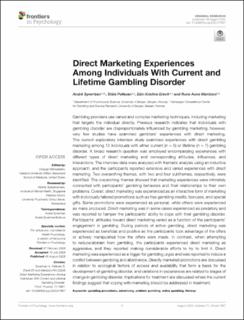| dc.description.abstract | Gambling providers use varied and complex marketing techniques, including marketing that targets the individual directly. Previous research indicates that individuals with gambling disorder are disproportionately influenced by gambling marketing, however, very few studies have examined gamblers’ experiences with direct marketing. The current exploratory interview study examined experiences with direct gambling marketing among 12 individuals with either current (n = 5) or lifetime (n = 7) gambling disorder. A broad research question was employed encompassing experiences with different types of direct marketing and corresponding attitudes, influences, and interactions. The interview data were analyzed with thematic analysis using an inductive approach, and the participants reported extensive and varied experiences with direct marketing. Two overarching themes, with two and four subthemes, respectively, were identified. The overarching themes showed that marketing experiences were intimately connected with participants’ gambling behaviors and their relationships to their own problems. Overall, direct marketing was experienced as an interactive form of marketing with individually tailored promotions such as free gambling credits, bonuses, and special gifts. Some promotions were experienced as personal, while others were experienced as mass produced. Direct marketing was in some cases experienced as predatory and was reported to hamper the participants’ ability to cope with their gambling disorder. Participants’ attitudes toward direct marketing varied as a function of the participants’ engagement in gambling. During periods of active gambling, direct marketing was experienced as beneficial and positive as the participants took advantage of the offers or actively manipulated how the offers were made. In contrast, when attempting to reduce/abstain from gambling, the participants experienced direct marketing as aggressive, and they reported making considerable efforts to try to limit it. Direct marketing was experienced as a trigger for gambling urges and was reported to induce a conflict between gambling and abstinence. Directly marketed promotions are discussed in relation to ecological factors of access and availability that form a basis for the development of gambling disorder, and variations in experiences are related to stages of change in gambling disorder. Implications for treatment are discussed where the current findings suggest that coping with marketing should be addressed in treatment. | en_US |

